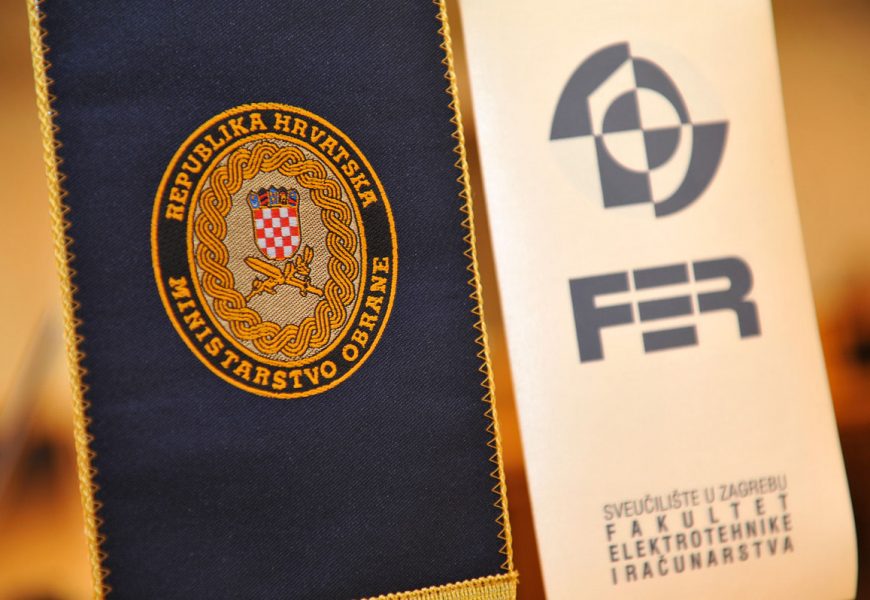Bozinovic and Peric signed Agreement on cooperation between MOD and FER
Agreement on Science and Technical Cooperation between the Ministry of Defence and the Faculty of Electrical Engineering and Computer Science (FER), University of Zagreb, which is the result of many years of cooperation between these two institutions in the fields of defence and security, was signed today, October 21 , at the Faculty, by minister of defence Davor Bozinovic and Dean of FER professor Nedjeljko Peric.
Signing was preceded by a presentation of Prof. Peric on the structure, capabilities and missions of the Faculty of Electrical Engineering and Computer Science, and present research projects. Dean Peric in this regard stated that “the mission of FER is to be the leading Croatian institution for research, innovation and education that will be integrated into the local environment to contribute to a development of the industry, as well as in European research and higher education space. We cover a wide range of professions, 12 expert institutes, and with our students, academic staff and researchers, I can proudly say that we have over 200 doctors of science”, prof. Peric said. Speaking of the main guidelines of research within the field of international scientific cooperation, he particularly emphasized current research projects financed by the EU, IPA and EU structural funds. “One of the such important projects for us is the EU project of the Centre of Excellence for advanced cooperative systems, which have received funding worth 3.3 million Euros, in which, along with our faculty, 16 European universities and three industrial partners Croatia – Končar, Ericsson Nikola Tesla and Doking were included, Dean Peric said. He said that the research goals of this project, among other things, were the development and communication facilities and cooperative development of advanced methods of artificial intelligence. “They will find their application, among others, in homeland security through the monitoring of state border, troops on the battlefield and the anti-terrorist fight”, he added. He also spoke about the previous experience in organizing meetings of NATO, NATO cooperation with the Centre for Offshore Exploration and scientific research projects for the Ministry of Defence and Armed Forces.
Defence Minister Davor Bozinovic, in his address stressed that the signing of the Agreement on scientific and technical cooperation was primarily an effort to systematically and distinctive arrange the cooperation that can certainly contribute significantly to improving the quality, technical modernization and generally the further development of the Armed Forces. “The MOD does not have such potential as FER, so we try to exploit the potential of companies and universities and expand this cooperation”, Bozinovic said. Speaking of the defence budget trends Bozinovic said that though the trend of reducing the defence budget, we have the growth of spending by a soldier”. Although the estimated reduction in the defence budget at around 40 billion Euros per year throughout Europe, spending per soldier, who now has to be multidisciplinary, rose from 70 to 90 000 euro per year. Therefore, this cooperation through the monitoring of new technologies in a number of areas that are of interest to the Armed Forces is extremely important. Today, the army is highly professionalised, Croatian soldier is fully equipped with Croatian industry products, and this is a continuous process of development and integration of science and production for the needs of society, and success lies in the rapid application of the latest developments to end users”, Minister Bozinovic said.
The agreement, according to Minister Bozinovic, should open a new international perspective, which primarily relates to the opportunities offered by the scientific community within the framework of NATO and its organizations. “Congratulations on your inclusion in the Framework Programme 7 of the European Union, which is worth EUR 50 billion for the budget period to 2013, from which you withdrew funds amounting to more than 3.3 million Euros for research. Scientific cooperation with NATO, is primarily related to the possibility of participation of scientists from Croatia to NATO bodies involved in research and technology, which encompasses a network of more than 3000 scientists, which cover different areas of defence technology”, Bozinovic said, adding that the “EU and NATO are opened through their programs and want to attract more scientists”. In the end, Minister Bozinovic congratulated Dean Peric on the extension of international ASIIN accreditation that ranked FER in the group of leading European universities with international accreditation. “The Ministry of Defence has the honour that we can cooperate with such a respectable institution for the benefit of our citizens and Croatia”, Bozinovic said.
[nggallery id=638]
